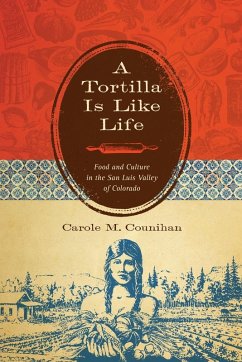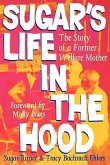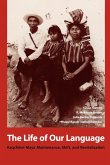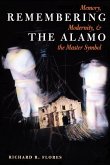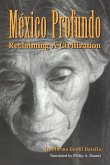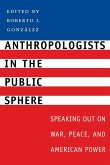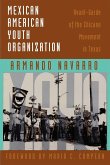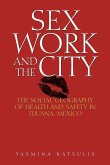- Broschiertes Buch
- Merkliste
- Auf die Merkliste
- Bewerten Bewerten
- Teilen
- Produkt teilen
- Produkterinnerung
- Produkterinnerung
An innovative portrait of a small Colorado town based on a decade's worth of food-centered life histories from nineteen of its female residents.
Andere Kunden interessierten sich auch für
![Sugar's Life in the Hood Sugar's Life in the Hood]() Sugar TurnerSugar's Life in the Hood32,99 €
Sugar TurnerSugar's Life in the Hood32,99 €![The Life of Our Language The Life of Our Language]() Susan GarzonThe Life of Our Language32,99 €
Susan GarzonThe Life of Our Language32,99 €![Remembering the Alamo Remembering the Alamo]() Richard R. FloresRemembering the Alamo32,99 €
Richard R. FloresRemembering the Alamo32,99 €![México Profundo México Profundo]() Guillermo Bonfil BatallaMéxico Profundo31,99 €
Guillermo Bonfil BatallaMéxico Profundo31,99 €![Anthropologists in the Public Sphere Anthropologists in the Public Sphere]() Roberto J. GonzálezAnthropologists in the Public Sphere37,99 €
Roberto J. GonzálezAnthropologists in the Public Sphere37,99 €![Mexican American Youth Organization Mexican American Youth Organization]() Armando NavarroMexican American Youth Organization38,99 €
Armando NavarroMexican American Youth Organization38,99 €![Sex Work and the City Sex Work and the City]() Yasmina KatsulisSex Work and the City26,99 €
Yasmina KatsulisSex Work and the City26,99 €-
-
-
An innovative portrait of a small Colorado town based on a decade's worth of food-centered life histories from nineteen of its female residents.
Hinweis: Dieser Artikel kann nur an eine deutsche Lieferadresse ausgeliefert werden.
Hinweis: Dieser Artikel kann nur an eine deutsche Lieferadresse ausgeliefert werden.
Produktdetails
- Produktdetails
- Verlag: University of Texas Press
- Seitenzahl: 270
- Erscheinungstermin: 1. November 2009
- Englisch
- Abmessung: 229mm x 152mm x 16mm
- Gewicht: 443g
- ISBN-13: 9780292723108
- ISBN-10: 0292723105
- Artikelnr.: 32727889
- Herstellerkennzeichnung
- Libri GmbH
- Europaallee 1
- 36244 Bad Hersfeld
- gpsr@libri.de
- Verlag: University of Texas Press
- Seitenzahl: 270
- Erscheinungstermin: 1. November 2009
- Englisch
- Abmessung: 229mm x 152mm x 16mm
- Gewicht: 443g
- ISBN-13: 9780292723108
- ISBN-10: 0292723105
- Artikelnr.: 32727889
- Herstellerkennzeichnung
- Libri GmbH
- Europaallee 1
- 36244 Bad Hersfeld
- gpsr@libri.de
By Carole M. Counihan
1. Preface
2. Acknowledgments
3. Chapter 1. "I Did Do Something": Food-Centered Life Histories in Antonito,
Colorado
* Why Antonito
* Methodology: Food-Centered Life Histories and Testimonios
* History of Antonito
* Antonito Today
* Study Participants
* The Ethnographic Process
* Helen Ruybal and Carole Counihan on Ethnography
* Conclusion
4. Chapter 2. "The Stereotypes Have to Be Broken": Identity and Ethnicity in
Antonito
* Antonito: An Insider/Outsider Perspective
* Janice DeHerrera on Antonito
* Language and Education, Spanish and English
* Teddy Madrid on Freedom of Speech
* Ramona Valdez on English and Spanish
* Helen Ruybal on Learning English and Being Smart
* Teddy Madrid on Learning English from the Presbyterians
* Ethnic, Gender, and Religious Identity
* Ramona Valdez on Ethnic Terminology
* Teddy Madrid on the Connection with Spain
* Discrimination and Prejudice
* Helen Ruybal on Discrimination
* Teddy Madrid on Multiple Identities and Axes of Prejudice
* Ramona Valdez on Religious and Anti-Hispanic Prejudice
* Bernadette Vigil on Chicano Consciousness
* Teddy Madrid on Identity, Terminology, and Prejudice
* Conclusion
5. Chapter 3. "Part of This World": Meanings of Land and Water
* Introduction
* History of Land: Acquisition and Loss
* Helen Ruybal's Land Acquisition and Sale
* Land and Its Meanings
* Monica Taylor's Dream of Land, Family, and Place
* Monica Taylor's Perceptions of the Land
* Ramona Valdez on the Meanings of Land
* Teddy Madrid on Land, Home, and Family
* Water in the Southwest
* The Multiple Meanings and Uses of Water
* Teddy Madrid on the Traditional Uses of Water
* Teddy Madrid on Water as a Commodity
* Janice DeHerrera on Water as a Commodity
* Monica Taylor on Water as Life
* Conclusion: Land, Water, Place, and Chicano Cultural Ecology
6. Chapter 4. "Anything You Want Is Going to Come from the Earth": The
Traditional Diet
* The Locally Produced Subsistence Diet
* Ramona Valdez's Food Narrative
* Meat: Domesticated and Wild Animal Foods
* Helen Ruybal on Raising Cattle and Beef
* Teddy Madrid on Fishing, Hunting, and Making Jerky
* Cultivated Foods: Grains, Beans, Vegetables, and Fruits
* Asuncionita Mondragon on Her Grandparents' Garden in La Isla
* Teddy Madrid on Food Production in Las Mesitas
* Bernadette Vigil on Red and Green Chili
* Gathered Plant Foods and Medicines
* Helen Ruybal on the Importance of Piñon in Her Family
* Teddy Madrid on Gathering Wild Foods in Las Mesitas
* Ramona Valdez on Healing Herbs
* Conclusion: Food, Place, and Culture
7. Chapter 5. "We've Got to Provide for the Family": Women, Food, and Work
* Production, Reproduction, and Gender
* Helen Ruybal's Story of Courtship and Marriage
* Gender Expectations and Practices
* Teddy Madrid on Her Family's Flexible Gender Division of Labor
* Monica Taylor on the Strong Women in Her Family
* Helen Ruybal on Gender Relations and Ideals
* Women and Food Work
* Teddy Madrid on Food Preservation
* Monica Taylor on Gardening and Preserving Food
* Janice DeHerrera on Food Preparation
* Earning Money with Food
* Helen Ruybal on Making and Selling Cheese
* Ramona Valdez on Working in the Fields
* Celina Romero on Working as a Cook and Field Hand
* Asuncionita Mondragon on Raising Poultry and Selling Eggs
* Balancing Work and Home
* Teddy Madrid's First Paycheck
* Teddy Madrid on Being a Working Woman
* Janice DeHerrera on Balancing Job and Home
* Conclusion
8. Chapter 6. "It's a Feeling Thing": Cooking and Women's Agency
* Cooking and Agency
* Teddy Madrid's Cooking Adventures
* To Cook or Not to Cook
* Helen Ruybal's and Her Sister's Different Approaches to Cooking
* Janice DeHerrera's Cooking Expectations
* Cooking, Self-Expression, and Emotional Connection
* Janice DeHerrera on Creativity and Cooking
* Janice DeHerrera on Cooking as Emotional Communication
* Cordi Ornelas's Paella
* Learning and Teaching Cooking
* Janice DeHerrera on Learning How to Cook
* Monica Taylor on Learning to Cook and the Family Biscochito Recipe
* Cooking and Gender
* Teddy Madrid on Cooking after Marriage
* Helen Ruybal on Her Husband Cooking
* Monica Taylor on the Chili Wars
* Conclusion
9. Chapter 7. "Meals Are Important, Maybe It's Love": Mexicano Meals and
Family
* Family in Antonito
* Janice DeHerrera on Family Ties versus Individual Ambition
* Teddy Madrid on Her Father's Family Charge
* Mexicano Family Meals
* Martha Mondragon on Family Meals and Television
* Janice DeHerrera on the Importance of the Family Meal
* Meals and Gender Roles
* Janice DeHerrera on Restaurants, Her First Communion, and Family
Gender Power
* Meals, Socialization, and Respect
* Janice DeHerrera on Meals in Her Family of Origin
* Martha Mondragon on Grace before Meals
* Teddy Madrid on Family Meals, Respect, and Socialization
* Asuncionita Mondragon on Teaching Spanish at Family Meals
* Conclusion
10. Chapter 8. "It Was a Give-and-Take": Sharing and Generosity versus Greed
and Envy
* Cooperative Labor Exchanges
* Cordi Ornelas on Work Parties
* Yolanda Salazar on Making and Selling Tamales
* Sharing and Generosity
* Asuncionita Mondragon on Sharing Food with Neighbors
* Helen Ruybal on Sharing Honey and Meat
* Greed and Envy
* Carmen Lopez and Helen Ruybal on Sharing, Cuzco, and Envidia
* Helen Ruybal on Envy
* Envy and Witchcraft
* Helen Ruybal on Witchcraft, Curanderas, and Envy
* Conclusion
11. Chapter 9. "Come out of Your Grief": Death and Commensality
* The Wake
* Cordi Ornelas on Foods at the Wake
* Helen Ruybal on Death, Velorios, and Funerals
* Food Gifts for the Bereaved
* Janice DeHerrera on Food and Death
* Martha Mondragon on Death and Food Sharing
* Farewell Dinners
* Yolanda Salazar on Death, Community, and Commensality
* Helen Ruybal on Farewell Dinners
* Rending and Mending Community
* Helen Ruybal on Different Funeral Traditions
* Teddy Madrid on Presbyterian Funeral Feasts
* Janice DeHerrera on the Meaning of Food at Funerals
* Conclusion
12. Chapter 10. "Give Because It Multiplies": Hunger and Response
* Poverty and Food Insecurity
* Bernadette Vigil on Caring and Hunger
* Janice DeHerrera on Traditions of Sharing Food
* Traditional Foodways, Sharing, and Making Do
* Teddy Madrid on Hunger, Scarcity, and Sharing
* Janice DeHerrera on Making Do with Beans, Tortillas, and Potatoes
* Hunger in School
* Janice DeHerrera on Hunger in the Elementary School
* The Antonito Food Bank
* Teddy Madrid on Presbyterian Support of the Food Bank
* Janice DeHerrera on Hunger, Conscience, and the Food Bank
* Conclusion
13. Chapter 11. Conclusion: "Our People Will Survive"
* The Fourth of July Meal
* Unpacking the Fourth of July Meal
* Explanations for the Antonito Diet
* Toward the Future
14. Appendix 1. Topics in Food-Centered Life Histories
15. Appendix 2. Categories of Analysis
16. Appendix 3. Population of Antonito, Conejos County, and Colorado, 1880-2000
17. Appendix 4. Wild Plants Used for Food or Healing in the Antonito Area
18. Notes
19. Glossary of Spanish Terms
20. Bibliography
21. Index
2. Acknowledgments
3. Chapter 1. "I Did Do Something": Food-Centered Life Histories in Antonito,
Colorado
* Why Antonito
* Methodology: Food-Centered Life Histories and Testimonios
* History of Antonito
* Antonito Today
* Study Participants
* The Ethnographic Process
* Helen Ruybal and Carole Counihan on Ethnography
* Conclusion
4. Chapter 2. "The Stereotypes Have to Be Broken": Identity and Ethnicity in
Antonito
* Antonito: An Insider/Outsider Perspective
* Janice DeHerrera on Antonito
* Language and Education, Spanish and English
* Teddy Madrid on Freedom of Speech
* Ramona Valdez on English and Spanish
* Helen Ruybal on Learning English and Being Smart
* Teddy Madrid on Learning English from the Presbyterians
* Ethnic, Gender, and Religious Identity
* Ramona Valdez on Ethnic Terminology
* Teddy Madrid on the Connection with Spain
* Discrimination and Prejudice
* Helen Ruybal on Discrimination
* Teddy Madrid on Multiple Identities and Axes of Prejudice
* Ramona Valdez on Religious and Anti-Hispanic Prejudice
* Bernadette Vigil on Chicano Consciousness
* Teddy Madrid on Identity, Terminology, and Prejudice
* Conclusion
5. Chapter 3. "Part of This World": Meanings of Land and Water
* Introduction
* History of Land: Acquisition and Loss
* Helen Ruybal's Land Acquisition and Sale
* Land and Its Meanings
* Monica Taylor's Dream of Land, Family, and Place
* Monica Taylor's Perceptions of the Land
* Ramona Valdez on the Meanings of Land
* Teddy Madrid on Land, Home, and Family
* Water in the Southwest
* The Multiple Meanings and Uses of Water
* Teddy Madrid on the Traditional Uses of Water
* Teddy Madrid on Water as a Commodity
* Janice DeHerrera on Water as a Commodity
* Monica Taylor on Water as Life
* Conclusion: Land, Water, Place, and Chicano Cultural Ecology
6. Chapter 4. "Anything You Want Is Going to Come from the Earth": The
Traditional Diet
* The Locally Produced Subsistence Diet
* Ramona Valdez's Food Narrative
* Meat: Domesticated and Wild Animal Foods
* Helen Ruybal on Raising Cattle and Beef
* Teddy Madrid on Fishing, Hunting, and Making Jerky
* Cultivated Foods: Grains, Beans, Vegetables, and Fruits
* Asuncionita Mondragon on Her Grandparents' Garden in La Isla
* Teddy Madrid on Food Production in Las Mesitas
* Bernadette Vigil on Red and Green Chili
* Gathered Plant Foods and Medicines
* Helen Ruybal on the Importance of Piñon in Her Family
* Teddy Madrid on Gathering Wild Foods in Las Mesitas
* Ramona Valdez on Healing Herbs
* Conclusion: Food, Place, and Culture
7. Chapter 5. "We've Got to Provide for the Family": Women, Food, and Work
* Production, Reproduction, and Gender
* Helen Ruybal's Story of Courtship and Marriage
* Gender Expectations and Practices
* Teddy Madrid on Her Family's Flexible Gender Division of Labor
* Monica Taylor on the Strong Women in Her Family
* Helen Ruybal on Gender Relations and Ideals
* Women and Food Work
* Teddy Madrid on Food Preservation
* Monica Taylor on Gardening and Preserving Food
* Janice DeHerrera on Food Preparation
* Earning Money with Food
* Helen Ruybal on Making and Selling Cheese
* Ramona Valdez on Working in the Fields
* Celina Romero on Working as a Cook and Field Hand
* Asuncionita Mondragon on Raising Poultry and Selling Eggs
* Balancing Work and Home
* Teddy Madrid's First Paycheck
* Teddy Madrid on Being a Working Woman
* Janice DeHerrera on Balancing Job and Home
* Conclusion
8. Chapter 6. "It's a Feeling Thing": Cooking and Women's Agency
* Cooking and Agency
* Teddy Madrid's Cooking Adventures
* To Cook or Not to Cook
* Helen Ruybal's and Her Sister's Different Approaches to Cooking
* Janice DeHerrera's Cooking Expectations
* Cooking, Self-Expression, and Emotional Connection
* Janice DeHerrera on Creativity and Cooking
* Janice DeHerrera on Cooking as Emotional Communication
* Cordi Ornelas's Paella
* Learning and Teaching Cooking
* Janice DeHerrera on Learning How to Cook
* Monica Taylor on Learning to Cook and the Family Biscochito Recipe
* Cooking and Gender
* Teddy Madrid on Cooking after Marriage
* Helen Ruybal on Her Husband Cooking
* Monica Taylor on the Chili Wars
* Conclusion
9. Chapter 7. "Meals Are Important, Maybe It's Love": Mexicano Meals and
Family
* Family in Antonito
* Janice DeHerrera on Family Ties versus Individual Ambition
* Teddy Madrid on Her Father's Family Charge
* Mexicano Family Meals
* Martha Mondragon on Family Meals and Television
* Janice DeHerrera on the Importance of the Family Meal
* Meals and Gender Roles
* Janice DeHerrera on Restaurants, Her First Communion, and Family
Gender Power
* Meals, Socialization, and Respect
* Janice DeHerrera on Meals in Her Family of Origin
* Martha Mondragon on Grace before Meals
* Teddy Madrid on Family Meals, Respect, and Socialization
* Asuncionita Mondragon on Teaching Spanish at Family Meals
* Conclusion
10. Chapter 8. "It Was a Give-and-Take": Sharing and Generosity versus Greed
and Envy
* Cooperative Labor Exchanges
* Cordi Ornelas on Work Parties
* Yolanda Salazar on Making and Selling Tamales
* Sharing and Generosity
* Asuncionita Mondragon on Sharing Food with Neighbors
* Helen Ruybal on Sharing Honey and Meat
* Greed and Envy
* Carmen Lopez and Helen Ruybal on Sharing, Cuzco, and Envidia
* Helen Ruybal on Envy
* Envy and Witchcraft
* Helen Ruybal on Witchcraft, Curanderas, and Envy
* Conclusion
11. Chapter 9. "Come out of Your Grief": Death and Commensality
* The Wake
* Cordi Ornelas on Foods at the Wake
* Helen Ruybal on Death, Velorios, and Funerals
* Food Gifts for the Bereaved
* Janice DeHerrera on Food and Death
* Martha Mondragon on Death and Food Sharing
* Farewell Dinners
* Yolanda Salazar on Death, Community, and Commensality
* Helen Ruybal on Farewell Dinners
* Rending and Mending Community
* Helen Ruybal on Different Funeral Traditions
* Teddy Madrid on Presbyterian Funeral Feasts
* Janice DeHerrera on the Meaning of Food at Funerals
* Conclusion
12. Chapter 10. "Give Because It Multiplies": Hunger and Response
* Poverty and Food Insecurity
* Bernadette Vigil on Caring and Hunger
* Janice DeHerrera on Traditions of Sharing Food
* Traditional Foodways, Sharing, and Making Do
* Teddy Madrid on Hunger, Scarcity, and Sharing
* Janice DeHerrera on Making Do with Beans, Tortillas, and Potatoes
* Hunger in School
* Janice DeHerrera on Hunger in the Elementary School
* The Antonito Food Bank
* Teddy Madrid on Presbyterian Support of the Food Bank
* Janice DeHerrera on Hunger, Conscience, and the Food Bank
* Conclusion
13. Chapter 11. Conclusion: "Our People Will Survive"
* The Fourth of July Meal
* Unpacking the Fourth of July Meal
* Explanations for the Antonito Diet
* Toward the Future
14. Appendix 1. Topics in Food-Centered Life Histories
15. Appendix 2. Categories of Analysis
16. Appendix 3. Population of Antonito, Conejos County, and Colorado, 1880-2000
17. Appendix 4. Wild Plants Used for Food or Healing in the Antonito Area
18. Notes
19. Glossary of Spanish Terms
20. Bibliography
21. Index
1. Preface
2. Acknowledgments
3. Chapter 1. "I Did Do Something": Food-Centered Life Histories in Antonito,
Colorado
* Why Antonito
* Methodology: Food-Centered Life Histories and Testimonios
* History of Antonito
* Antonito Today
* Study Participants
* The Ethnographic Process
* Helen Ruybal and Carole Counihan on Ethnography
* Conclusion
4. Chapter 2. "The Stereotypes Have to Be Broken": Identity and Ethnicity in
Antonito
* Antonito: An Insider/Outsider Perspective
* Janice DeHerrera on Antonito
* Language and Education, Spanish and English
* Teddy Madrid on Freedom of Speech
* Ramona Valdez on English and Spanish
* Helen Ruybal on Learning English and Being Smart
* Teddy Madrid on Learning English from the Presbyterians
* Ethnic, Gender, and Religious Identity
* Ramona Valdez on Ethnic Terminology
* Teddy Madrid on the Connection with Spain
* Discrimination and Prejudice
* Helen Ruybal on Discrimination
* Teddy Madrid on Multiple Identities and Axes of Prejudice
* Ramona Valdez on Religious and Anti-Hispanic Prejudice
* Bernadette Vigil on Chicano Consciousness
* Teddy Madrid on Identity, Terminology, and Prejudice
* Conclusion
5. Chapter 3. "Part of This World": Meanings of Land and Water
* Introduction
* History of Land: Acquisition and Loss
* Helen Ruybal's Land Acquisition and Sale
* Land and Its Meanings
* Monica Taylor's Dream of Land, Family, and Place
* Monica Taylor's Perceptions of the Land
* Ramona Valdez on the Meanings of Land
* Teddy Madrid on Land, Home, and Family
* Water in the Southwest
* The Multiple Meanings and Uses of Water
* Teddy Madrid on the Traditional Uses of Water
* Teddy Madrid on Water as a Commodity
* Janice DeHerrera on Water as a Commodity
* Monica Taylor on Water as Life
* Conclusion: Land, Water, Place, and Chicano Cultural Ecology
6. Chapter 4. "Anything You Want Is Going to Come from the Earth": The
Traditional Diet
* The Locally Produced Subsistence Diet
* Ramona Valdez's Food Narrative
* Meat: Domesticated and Wild Animal Foods
* Helen Ruybal on Raising Cattle and Beef
* Teddy Madrid on Fishing, Hunting, and Making Jerky
* Cultivated Foods: Grains, Beans, Vegetables, and Fruits
* Asuncionita Mondragon on Her Grandparents' Garden in La Isla
* Teddy Madrid on Food Production in Las Mesitas
* Bernadette Vigil on Red and Green Chili
* Gathered Plant Foods and Medicines
* Helen Ruybal on the Importance of Piñon in Her Family
* Teddy Madrid on Gathering Wild Foods in Las Mesitas
* Ramona Valdez on Healing Herbs
* Conclusion: Food, Place, and Culture
7. Chapter 5. "We've Got to Provide for the Family": Women, Food, and Work
* Production, Reproduction, and Gender
* Helen Ruybal's Story of Courtship and Marriage
* Gender Expectations and Practices
* Teddy Madrid on Her Family's Flexible Gender Division of Labor
* Monica Taylor on the Strong Women in Her Family
* Helen Ruybal on Gender Relations and Ideals
* Women and Food Work
* Teddy Madrid on Food Preservation
* Monica Taylor on Gardening and Preserving Food
* Janice DeHerrera on Food Preparation
* Earning Money with Food
* Helen Ruybal on Making and Selling Cheese
* Ramona Valdez on Working in the Fields
* Celina Romero on Working as a Cook and Field Hand
* Asuncionita Mondragon on Raising Poultry and Selling Eggs
* Balancing Work and Home
* Teddy Madrid's First Paycheck
* Teddy Madrid on Being a Working Woman
* Janice DeHerrera on Balancing Job and Home
* Conclusion
8. Chapter 6. "It's a Feeling Thing": Cooking and Women's Agency
* Cooking and Agency
* Teddy Madrid's Cooking Adventures
* To Cook or Not to Cook
* Helen Ruybal's and Her Sister's Different Approaches to Cooking
* Janice DeHerrera's Cooking Expectations
* Cooking, Self-Expression, and Emotional Connection
* Janice DeHerrera on Creativity and Cooking
* Janice DeHerrera on Cooking as Emotional Communication
* Cordi Ornelas's Paella
* Learning and Teaching Cooking
* Janice DeHerrera on Learning How to Cook
* Monica Taylor on Learning to Cook and the Family Biscochito Recipe
* Cooking and Gender
* Teddy Madrid on Cooking after Marriage
* Helen Ruybal on Her Husband Cooking
* Monica Taylor on the Chili Wars
* Conclusion
9. Chapter 7. "Meals Are Important, Maybe It's Love": Mexicano Meals and
Family
* Family in Antonito
* Janice DeHerrera on Family Ties versus Individual Ambition
* Teddy Madrid on Her Father's Family Charge
* Mexicano Family Meals
* Martha Mondragon on Family Meals and Television
* Janice DeHerrera on the Importance of the Family Meal
* Meals and Gender Roles
* Janice DeHerrera on Restaurants, Her First Communion, and Family
Gender Power
* Meals, Socialization, and Respect
* Janice DeHerrera on Meals in Her Family of Origin
* Martha Mondragon on Grace before Meals
* Teddy Madrid on Family Meals, Respect, and Socialization
* Asuncionita Mondragon on Teaching Spanish at Family Meals
* Conclusion
10. Chapter 8. "It Was a Give-and-Take": Sharing and Generosity versus Greed
and Envy
* Cooperative Labor Exchanges
* Cordi Ornelas on Work Parties
* Yolanda Salazar on Making and Selling Tamales
* Sharing and Generosity
* Asuncionita Mondragon on Sharing Food with Neighbors
* Helen Ruybal on Sharing Honey and Meat
* Greed and Envy
* Carmen Lopez and Helen Ruybal on Sharing, Cuzco, and Envidia
* Helen Ruybal on Envy
* Envy and Witchcraft
* Helen Ruybal on Witchcraft, Curanderas, and Envy
* Conclusion
11. Chapter 9. "Come out of Your Grief": Death and Commensality
* The Wake
* Cordi Ornelas on Foods at the Wake
* Helen Ruybal on Death, Velorios, and Funerals
* Food Gifts for the Bereaved
* Janice DeHerrera on Food and Death
* Martha Mondragon on Death and Food Sharing
* Farewell Dinners
* Yolanda Salazar on Death, Community, and Commensality
* Helen Ruybal on Farewell Dinners
* Rending and Mending Community
* Helen Ruybal on Different Funeral Traditions
* Teddy Madrid on Presbyterian Funeral Feasts
* Janice DeHerrera on the Meaning of Food at Funerals
* Conclusion
12. Chapter 10. "Give Because It Multiplies": Hunger and Response
* Poverty and Food Insecurity
* Bernadette Vigil on Caring and Hunger
* Janice DeHerrera on Traditions of Sharing Food
* Traditional Foodways, Sharing, and Making Do
* Teddy Madrid on Hunger, Scarcity, and Sharing
* Janice DeHerrera on Making Do with Beans, Tortillas, and Potatoes
* Hunger in School
* Janice DeHerrera on Hunger in the Elementary School
* The Antonito Food Bank
* Teddy Madrid on Presbyterian Support of the Food Bank
* Janice DeHerrera on Hunger, Conscience, and the Food Bank
* Conclusion
13. Chapter 11. Conclusion: "Our People Will Survive"
* The Fourth of July Meal
* Unpacking the Fourth of July Meal
* Explanations for the Antonito Diet
* Toward the Future
14. Appendix 1. Topics in Food-Centered Life Histories
15. Appendix 2. Categories of Analysis
16. Appendix 3. Population of Antonito, Conejos County, and Colorado, 1880-2000
17. Appendix 4. Wild Plants Used for Food or Healing in the Antonito Area
18. Notes
19. Glossary of Spanish Terms
20. Bibliography
21. Index
2. Acknowledgments
3. Chapter 1. "I Did Do Something": Food-Centered Life Histories in Antonito,
Colorado
* Why Antonito
* Methodology: Food-Centered Life Histories and Testimonios
* History of Antonito
* Antonito Today
* Study Participants
* The Ethnographic Process
* Helen Ruybal and Carole Counihan on Ethnography
* Conclusion
4. Chapter 2. "The Stereotypes Have to Be Broken": Identity and Ethnicity in
Antonito
* Antonito: An Insider/Outsider Perspective
* Janice DeHerrera on Antonito
* Language and Education, Spanish and English
* Teddy Madrid on Freedom of Speech
* Ramona Valdez on English and Spanish
* Helen Ruybal on Learning English and Being Smart
* Teddy Madrid on Learning English from the Presbyterians
* Ethnic, Gender, and Religious Identity
* Ramona Valdez on Ethnic Terminology
* Teddy Madrid on the Connection with Spain
* Discrimination and Prejudice
* Helen Ruybal on Discrimination
* Teddy Madrid on Multiple Identities and Axes of Prejudice
* Ramona Valdez on Religious and Anti-Hispanic Prejudice
* Bernadette Vigil on Chicano Consciousness
* Teddy Madrid on Identity, Terminology, and Prejudice
* Conclusion
5. Chapter 3. "Part of This World": Meanings of Land and Water
* Introduction
* History of Land: Acquisition and Loss
* Helen Ruybal's Land Acquisition and Sale
* Land and Its Meanings
* Monica Taylor's Dream of Land, Family, and Place
* Monica Taylor's Perceptions of the Land
* Ramona Valdez on the Meanings of Land
* Teddy Madrid on Land, Home, and Family
* Water in the Southwest
* The Multiple Meanings and Uses of Water
* Teddy Madrid on the Traditional Uses of Water
* Teddy Madrid on Water as a Commodity
* Janice DeHerrera on Water as a Commodity
* Monica Taylor on Water as Life
* Conclusion: Land, Water, Place, and Chicano Cultural Ecology
6. Chapter 4. "Anything You Want Is Going to Come from the Earth": The
Traditional Diet
* The Locally Produced Subsistence Diet
* Ramona Valdez's Food Narrative
* Meat: Domesticated and Wild Animal Foods
* Helen Ruybal on Raising Cattle and Beef
* Teddy Madrid on Fishing, Hunting, and Making Jerky
* Cultivated Foods: Grains, Beans, Vegetables, and Fruits
* Asuncionita Mondragon on Her Grandparents' Garden in La Isla
* Teddy Madrid on Food Production in Las Mesitas
* Bernadette Vigil on Red and Green Chili
* Gathered Plant Foods and Medicines
* Helen Ruybal on the Importance of Piñon in Her Family
* Teddy Madrid on Gathering Wild Foods in Las Mesitas
* Ramona Valdez on Healing Herbs
* Conclusion: Food, Place, and Culture
7. Chapter 5. "We've Got to Provide for the Family": Women, Food, and Work
* Production, Reproduction, and Gender
* Helen Ruybal's Story of Courtship and Marriage
* Gender Expectations and Practices
* Teddy Madrid on Her Family's Flexible Gender Division of Labor
* Monica Taylor on the Strong Women in Her Family
* Helen Ruybal on Gender Relations and Ideals
* Women and Food Work
* Teddy Madrid on Food Preservation
* Monica Taylor on Gardening and Preserving Food
* Janice DeHerrera on Food Preparation
* Earning Money with Food
* Helen Ruybal on Making and Selling Cheese
* Ramona Valdez on Working in the Fields
* Celina Romero on Working as a Cook and Field Hand
* Asuncionita Mondragon on Raising Poultry and Selling Eggs
* Balancing Work and Home
* Teddy Madrid's First Paycheck
* Teddy Madrid on Being a Working Woman
* Janice DeHerrera on Balancing Job and Home
* Conclusion
8. Chapter 6. "It's a Feeling Thing": Cooking and Women's Agency
* Cooking and Agency
* Teddy Madrid's Cooking Adventures
* To Cook or Not to Cook
* Helen Ruybal's and Her Sister's Different Approaches to Cooking
* Janice DeHerrera's Cooking Expectations
* Cooking, Self-Expression, and Emotional Connection
* Janice DeHerrera on Creativity and Cooking
* Janice DeHerrera on Cooking as Emotional Communication
* Cordi Ornelas's Paella
* Learning and Teaching Cooking
* Janice DeHerrera on Learning How to Cook
* Monica Taylor on Learning to Cook and the Family Biscochito Recipe
* Cooking and Gender
* Teddy Madrid on Cooking after Marriage
* Helen Ruybal on Her Husband Cooking
* Monica Taylor on the Chili Wars
* Conclusion
9. Chapter 7. "Meals Are Important, Maybe It's Love": Mexicano Meals and
Family
* Family in Antonito
* Janice DeHerrera on Family Ties versus Individual Ambition
* Teddy Madrid on Her Father's Family Charge
* Mexicano Family Meals
* Martha Mondragon on Family Meals and Television
* Janice DeHerrera on the Importance of the Family Meal
* Meals and Gender Roles
* Janice DeHerrera on Restaurants, Her First Communion, and Family
Gender Power
* Meals, Socialization, and Respect
* Janice DeHerrera on Meals in Her Family of Origin
* Martha Mondragon on Grace before Meals
* Teddy Madrid on Family Meals, Respect, and Socialization
* Asuncionita Mondragon on Teaching Spanish at Family Meals
* Conclusion
10. Chapter 8. "It Was a Give-and-Take": Sharing and Generosity versus Greed
and Envy
* Cooperative Labor Exchanges
* Cordi Ornelas on Work Parties
* Yolanda Salazar on Making and Selling Tamales
* Sharing and Generosity
* Asuncionita Mondragon on Sharing Food with Neighbors
* Helen Ruybal on Sharing Honey and Meat
* Greed and Envy
* Carmen Lopez and Helen Ruybal on Sharing, Cuzco, and Envidia
* Helen Ruybal on Envy
* Envy and Witchcraft
* Helen Ruybal on Witchcraft, Curanderas, and Envy
* Conclusion
11. Chapter 9. "Come out of Your Grief": Death and Commensality
* The Wake
* Cordi Ornelas on Foods at the Wake
* Helen Ruybal on Death, Velorios, and Funerals
* Food Gifts for the Bereaved
* Janice DeHerrera on Food and Death
* Martha Mondragon on Death and Food Sharing
* Farewell Dinners
* Yolanda Salazar on Death, Community, and Commensality
* Helen Ruybal on Farewell Dinners
* Rending and Mending Community
* Helen Ruybal on Different Funeral Traditions
* Teddy Madrid on Presbyterian Funeral Feasts
* Janice DeHerrera on the Meaning of Food at Funerals
* Conclusion
12. Chapter 10. "Give Because It Multiplies": Hunger and Response
* Poverty and Food Insecurity
* Bernadette Vigil on Caring and Hunger
* Janice DeHerrera on Traditions of Sharing Food
* Traditional Foodways, Sharing, and Making Do
* Teddy Madrid on Hunger, Scarcity, and Sharing
* Janice DeHerrera on Making Do with Beans, Tortillas, and Potatoes
* Hunger in School
* Janice DeHerrera on Hunger in the Elementary School
* The Antonito Food Bank
* Teddy Madrid on Presbyterian Support of the Food Bank
* Janice DeHerrera on Hunger, Conscience, and the Food Bank
* Conclusion
13. Chapter 11. Conclusion: "Our People Will Survive"
* The Fourth of July Meal
* Unpacking the Fourth of July Meal
* Explanations for the Antonito Diet
* Toward the Future
14. Appendix 1. Topics in Food-Centered Life Histories
15. Appendix 2. Categories of Analysis
16. Appendix 3. Population of Antonito, Conejos County, and Colorado, 1880-2000
17. Appendix 4. Wild Plants Used for Food or Healing in the Antonito Area
18. Notes
19. Glossary of Spanish Terms
20. Bibliography
21. Index

